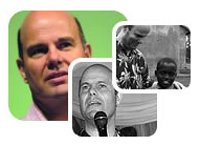 The reason for the huge increase is that astronomers are discovering planets around stars other than our own Sun using several techniques.
The reason for the huge increase is that astronomers are discovering planets around stars other than our own Sun using several techniques.Sometimes this can be done by accurate measurements of the parent star's brightness. If a planet orbiting the star happens to pass in front of it, it will block part of the light and the dip can be measured and timed.
Another method involves tracking the position of a star very accurately. If it wobbles to and fro ever so slightly this is evidence of a smaller object in orbit around it - a planet or a faint companion star.
More recently it's become possible to image some of these planets directly by detecting the light they reflect from their parent star. This is pretty tricky, but just about doable using current telescopes. Of course we can't see any details, the planetary image is essentially a highly blurred point source. But it's still a very impressive feat of technology.
'Discover' magazine's website presents a gallery of these images, with good explanations in terms most people will understand. It's well worth a look.
The number of exoplanets will continue to rise and will soon pass the 500 mark. And one day, with better telescopes, it may even become possible to see some basic detail on some of these planets. But that is probably a long, long way off.
See also: Fomalhaut b






